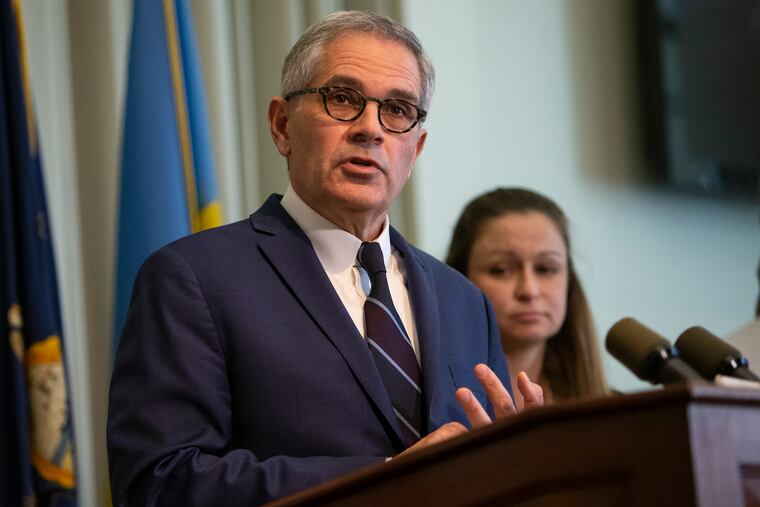Kensington man guilty of trafficking, abusing women in his house
DA Larry Krasner and other officials from his office and the Police Department said that 50-year-old Richard Collins enticed women into his home with the promise of drugs and a safe place to live, then forced them into sex work.

One woman estimated that Richard Collins forced her into 2,000 sexual encounters with other men, about 15 to 16 per day. She told police he also beat her, had violent sex with her, recorded videos of some acts on his cell phone, and once poured near-boiling water on her when she didn’t want to sleep in his bed, according to court documents.
At his rowhouse in the heart of Kensington, the epicenter of the city’s opioid crisis, Collins offered women a place to stay and drugs to get high, according to prosecutors and court documents. He told some women he loved them, and further enticed them by preying on their addiction.
But Collins’ hospitality quickly devolved. He forced the women he housed into sex work around the neighborhood, took their cash, and beat them or withheld drugs if he thought they weren’t making enough money.
Then, last June, a 23-year-old woman visited Collins’ house to see some of the women inside and Collins began beating her, prosecutors said. She knocked down a back door, jumped 4 feet down into the backyard, and climbed over a barbed-wire fence to flee. Soon afterward, she went to police.
On Monday, District Attorney Larry Krasner announced the end of a process that began with that woman’s escape and concluded with guilty verdicts against Collins last week on charges related to his trafficking and abuse of the women. The counts included aggravated assault, raping an unconscious victim, strangling, human trafficking, and involuntary servitude.
“For far too long, it’s been the situation that people who are victimized, or are having to survive this type of abuse, believe that they are not going to be believed,” Krasner said. “Well, yes they are.”
Krasner and other officials who spoke at a news conference, including prosecutors and police officers, painted the case as a unique example of a city trial that ended in a conviction for adult victims subjected to human trafficking. Jurors voted to convict Collins on Friday; his sentencing is scheduled for October, and he faces a maximum prison sentence of 75 to 150 years, the District Attorney’s Office said.
In 2017, the Police Department launched a task force to investigate human trafficking, but Lt. Harold Lloyd said Monday that Collins’ case was the first centered on adult victims. Trafficking cases can be difficult to investigate and prove in court, Lloyd said, but when he was asked if he believes there are other cases like Collins’ occurring in Philadelphia, he did not hesitate.
“We know for a fact" that there are, he said.
The National Human Trafficking Hotline reported that in 2017, the last full year for which data were available, 204 human trafficking cases were reported in Pennsylvania, 77% of which were sex trafficking. Still, the organization warned that trafficking cases are likely significantly underreported due to fear or lack of awareness on the issue.
Krasner said human trafficking victims often have been afraid to come forward for fear of worsening their situation, or being ignored or not believed. Some also believe they might be prosecuted for sex crimes or drug possession, the district attorney said, but he added: “We are here to protect you.”
Last year, Krasner introduced a policy instructing assistant district attorneys to decline or divert most charges against sex workers. He said Monday: “Some of what has been done to try to stop sex work by old techniques of enforcement … has made it worse, because it is that stigma that prevents our ability and the ability of the police to get survivors and victims to come forward.”
Officials commended the victims in Collins’ case, three of whom took the stand during his trial last week. They were not identified by prosecutors or in court documents, and The Inquirer does not name victims of sexual assault without their permission.
Assistant District Attorney Carly Nixon said of the victims: “Their bravery was louder than their fear of Richard Collins. And it was a privilege to be in that courtroom and listen to them speak.”
Attempts to reach Collins’ defense attorney, Michael Coard, for comment Monday were not successful.
Investigators began probing Collins’ case last June, after he assaulted the 23-year-old woman who had visited his house in the 800 block of Hilton Street.
After the woman broke out and told police that Collins was holding women in the house, officers responded with a warrant and found three women inside. A fourth victim was discovered later, officials said.
Detective Kathryn Gordon said that Collins forced the women — who ranged in age from 20 to 28 and were struggling with addiction — “to take dates all night,” then remain awake in case another man came to the house. Collins sometimes withheld food or drugs, making them ill, Gordon said, and sexually assaulted them, harming them if they resisted.
“They were fully dependent on this man,” Gordon said.
The detective said two women stayed in his house off and on for several months, and two others had lived there for a few weeks. The woman who escaped the house last June had been inside for only a few hours, officials said.
She was killed before Collins’ trial in an act of domestic violence that officials said was unrelated to this case. Prosecutors said they promised her mother they would let the city know about her “incredibly selfless bravery.”
Gordon said the surviving victims are in various stages of recovery, and that they are “doing much better” than before.
Gordon said one of the women called her after testifying, telling the detective “that was the first night she’d slept in years.”